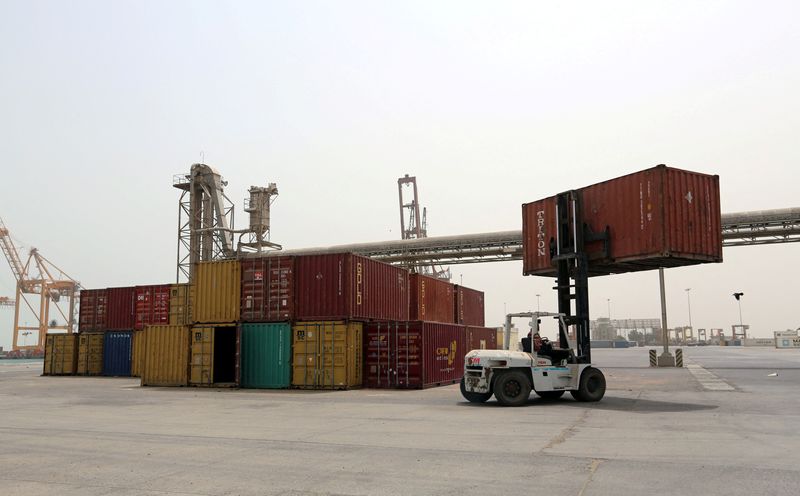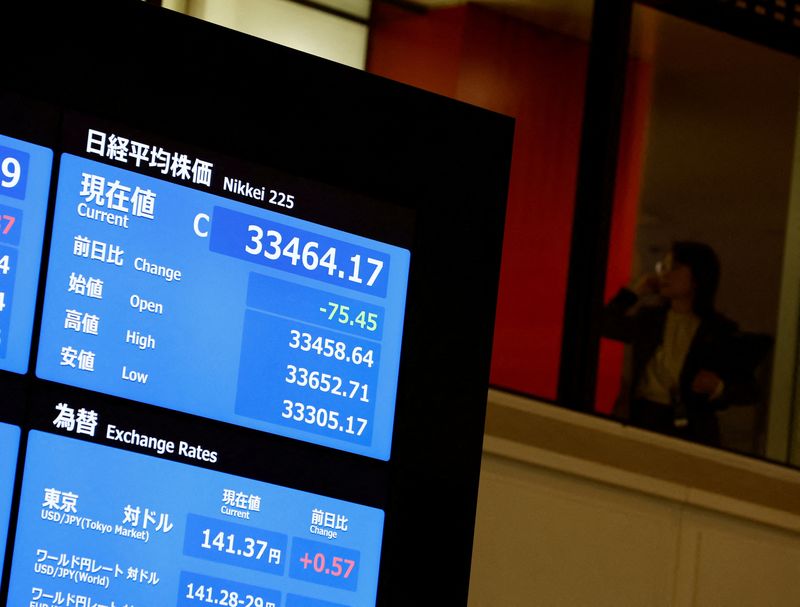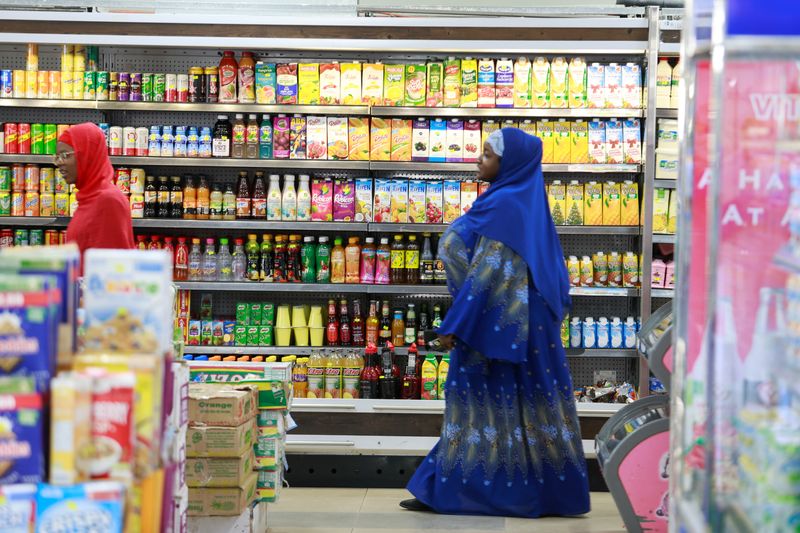Select Language

SEOUL (Reuters) - South Korea's government said on Wednesday it plans to implement a package of financial policies to support stock investors and small business owners squeezed by high interest rates.
The financial support measures come three months ahead of the country's general elections and as the president holds a series of policy discussion forums this month.
The government is scrapping its plan to impose capital gains taxes on income exceeding 50 million won ($37,359.99) from stock investments, which was introduced by the previous administration and due to be implemented from next year, the Financial Services Commission said in a statement.
In South Korea, only "large shareholders", who hold more than five billion won worth of stocks in a listed company, are currently subject to capital gains tax. That threshold was raised from one billion won last December.
The government would continue making progress to improve stock short-selling rules to ensure a "level playing field" between retail and institutional investors, said the commission, which is the ministry in charge of financial policies and regulations.
To help ease the burden of high interest rates, local banks will return a total of 1.6 trillion won ($1.20 billion) of interest income to small businesses and the self-employed who have taken out loans, according to the commission.
For up to 2.9 million people with overdue repayments on loans, the government said it will provide a "credit rating pardon" to help them return to economic activity with a clean financial record.
($1 = 1,338.3300 won)

BEIJING (Reuters) - China's December new home prices fell at the fastest pace since February 2015, marking the sixth straight month of declines, official data showed on Wednesday, with the sector still struggling to get back on its feet due to weak confidence.
New home prices fell 0.4% month-on-month after dipping 0.3% in November, according to Reuters calculations based on National Bureau of Statistics (NBS) data.
Prices were down 0.4% from a year earlier, compared with a 0.2% fall in November.
Authorities have been scrambling to roll out measures to boost sentiment, but home buyers remain cautious amid a sluggish economy and prolonged property crisis.

By Nicole Jao
NEW YORK (Reuters) - Wind and solar are set to lead U.S. power generation growth for the next two years following new renewable energy instillations, Energy Information Administration (EIA) said on Tuesday.
U.S. solar power generation is expected to grow 75% to 286 billion kilowatt hours (kWh)in 2025 from 163 billion kWh in 2023 as more generation capacity comes online and amid favorable tax credit polices, the EIA said.
The electric power sector is expected to grow solar capacity by nearly 38% this year.
Wind power generation will grow moderately to 476 billion kWh in 2025, representing 11% increase, the EIA said, adding that wind capacity will stay relatively flat this year.
Coal power generation, meanwhile, will likely fall 18% to 548 billion kWh in 2025 from 665 billion kWh in 2023.
Generation from natural gas, the largest source of U.S. electricity, will stay relatively flat at 1.7 trillion kWh in 2024 and 2025.
Last year, the U.S. power sector produced around 4 trillion kWh of power. Renewable sources, including wind and solar, accounted for 22% of generation.

(Reuters) -Attacks on vessels by Iranian-backed Houthi militants in Yemen have disrupted international commerce on the shortest shipping route between Europe and Asia.
The attacks, targeting a route that accounts for about 15% of the world's shipping traffic, have pushed several shipping companies to reroute their vessels.
The U.S. and Britain launched dozens of air strikes against Houthi military targets overnight on Jan. 11 and 12 in retaliation for the attacks, widening regional conflict stemming from Israel's war in Gaza.
Below are companies' responses to the disturbances (in alphabetical order):
AB FOODS
The Primark-owner is monitoring the situation, but its supply chains are capable of some adjustment, a company spokesperson said, adding that so far it sees no need to be concerned.
BP (NYSE:BP)
The oil major on Dec. 18 said it had temporarily paused all transits through the Red Sea.
DANONE
The French food group said in December that most of its shipments had been diverted, increasing transit times. Should the situation last beyond 2-3 months, Danone will activate mitigation plans, including using alternate routes via sea or road wherever possible, a spokesperson said.
DHL
The German logistic company, which does not operate ships but uses them to transport containers, on Jan. 8 advised its customers to take a close look at how they manage inventories.
ELECTROLUX
The Swedish home appliance maker has set up a task force to find alternative routes or identify priority deliveries to try to avoid disruptions. It sees a limited impact on deliveries for now.
EQUINOR
The Norwegian oil and gas firm on Dec. 18 said it had rerouted vessels that had been heading towards the Red Sea.
ESSITY
The maker of brands such as Libresse and TENA said it was staying in contact with impacted suppliers to ensure continued flow of goods, but added the impact on its business was limited.
EUROPRIS
The Norwegian retailer, which imports 35-40% of goods sold from Asia via sea freight, on Jan. 5 said it had not considered other shipping options as this would increase costs. It said longer shipping times were within its safety margin and no significant challenges were expected.
FEDEX
The U.S. parcel delivery giant said on Jan. 14 it hasn't seen much of a shift to air freight due to disruptions in the Red Sea.
GEELY
Geely, China's second-largest automaker by sales, said on Dec. 22 its EV sales would likely be impacted by a delay in deliveries, as most shipping firms it uses to export EVs to Europe reroute ships around Africa.
IKEA
The Swedish ready-to-assemble furniture retailer on Dec. 19 said the situation would result in delays and may cause availability constraints for certain products. "We are evaluating other supply options to secure the availability of our products," it said.
KONE
The Finnish elevator maker said the situation may in some cases delay shipments, but most of its customer deliveries should stay on schedule. Kone said it had prepared for the disruptions by seeking alternative delivery methods and routes.
LIDL
Lidl unit Tailwind Shipping Lines, which transports non-food goods for the discount supermarket chain and goods for third-party customers, said it was sailing around Africa for now.
MOSAIC
The U.S. fertilizer company said on Dec. 18 it had rerouted a couple of U.S.-bound shipments around Africa.
NEXT
The British clothing retailer's CEO on Jan. 4 said sales growth would likely be moderated if disruptions continued through 2024. He said Next, which sources the majority of its products from Asia, could mitigate this through earlier ordering or using some air freight.
QATARENERGY
The world's second largest exporter of liquefied natural gas has stopped sending tankers via the Red Sea although production continues, a senior source with direct knowledge of the matter told Reuters on Jan. 15.
SAINSBURY'S
Britain's second largest grocer said on Jan. 10 it was in regular contact with the UK government about the Red Sea disruptions.
"We're making sure that we plan the sequencing of product from Asia Pacific so that we get products in the right order," CEO Simon Roberts said, noting that long term contracts with shippers "mitigate any cost impact as far as possible".
TARGET
A source familiar with the matter told Reuters on Jan. 12 the U.S. retailer is experiencing some disruptions of shipments from India and Pakistan, a big region for apparel manufacturing, calling the effect "minor" overall.
TESLA
The U.S. EV maker will suspend most car production at its factory near Berlin from Jan. 29 to Feb. 11 due to a lack of components caused by shifts in transport routes.
TRACTOR SUPPLY
Deliveries for the U.S. retailer have been delayed anywhere from two to 20-plus days, the company's chief supply chain operator said on Jan. 12.
TSMC,
The world's top contract chipmaker said on Dec. 19 it did not anticipate a significant impact on its operations.
VOLKSWAGEN
A company spokesperson said on Jan. 12 the German carmaker does not expect "significant" restrictions to production.
VOLVO CAR
The Swedish automaker said on Jan. 12 it would halt production at its plant in Belgium for three days due to delays caused by the situation in the Red Sea.
WHIRLPOOL
The appliances maker said in December it was closely monitoring logistics issues in the region to help mitigate risks as they arise, adding there was no impact to its business so far.
YARA
The Norwegian fertilizer maker told Reuters it was only mildly impacted, though the Red Sea is an important supply route for the company.

By Steven Scheer
JERUSALEM (Reuters) - Israel's cabinet on Monday passed a disputed 2024 state budget with amendments adding 55 billion shekels ($15 billion) of spending after over three months of war with Hamas, the Finance Ministry and Prime Minister's Office said.
With Israel's war against the Palestinian Islamist group passing 100 days on Sunday, the amended budget will include more money for defence and compensation for those impacted by the conflict, along with higher allocations for healthcare, police, welfare and education.
"We changed the priorities so that every reservist and every fighter and his family knows that there is a government that stands behind him and fully takes care of him," Finance Minister Bezalel Smotrich said after the vote.
The approval came after more than 24 hours of debate in which a vote was delayed by ministers unhappy with the level of budget cuts to some ministries meant to offset extra war spending. In the end, some planned cuts to health and internal security were scrapped to ensure passage of the budget.
In all, total spending in 2024 will amount to 582 billion shekels, up some 70 billion from its initial budget and after 20 billion shekels of across the board reductions. The ministry projects a budget deficit of 6.6% of GDP this year.
Israel last year approved a two-year budget for 2023 and 2024, but the Gaza war has shaken up government finances, requiring budget changes and additional spending.
Ministers from National Unity, a small centrist party that is led by Prime Minister Benjamin Netanyahu's main political rival Benny Gantz and joined an emergency government at the start of the war, voted against the budget since demands for a downsizing of government ministries and freeze on lawmakers' salaries were not met.
Gantz's party also voiced disappointment that so-called coalition funds were not reduced more, saying there was still time to show "national responsibility" before the budget was fully approved by parliament.
In recent weeks, the budget has become politically charged, in particular over payments Netanyahu agreed under a 2022 coalition accord with Smotrich and the heads of other religious parties.
That accord was for 8 billion shekels ($2.15 billion) to be set aside for ultra-Orthodox and far-right parties in 2024. According to a budget draft, only 2.5 billion shekels of that will be cut, despite the war funding needs.
The budget approval is also likely to upset the Bank of Israel, which has been urging the government to cut more spending and raise taxes to prevent the deficit from swelling.
In the budget, there will be some tax hikes this year to cigarettes and tobacco products and on bank profits.
($1 = 3.7479 shekels)

By Ankur Banerjee
SINGAPORE (Reuters) -The dollar rose on Tuesday as investors pared back bets on near-term rate-cuts by the U.S. Federal Reserve following hawkish comments from European Central Bank officials, while worries of more attacks on ships in the Red Sea weighed on risk sentiment.
Against a basket of currencies, the dollar rose 0.253% to 102.90, after having gained 0.2% overnight in subdued trading during a U.S. public holiday on Monday.
The euro fell 0.3% to $1.09185, set for its steepest one-day percentage drop in two weeks. Sterling was last at $1.2681, down 0.36% on the day, edging away from a near-five month high of $1.2825 hit late December.
Comments from European Central Bank officials pushing back against early rate cuts cast a shadow on rates outlook globally. "It's too early to talk about cuts, inflation is too high," ECB's Joachim Nagel said on Monday, adding that the mistake of lowering interest rates too early should be avoided.
Money markets are pricing in 145 basis points worth of cuts to the ECB's deposit rate this year, most likely starting in April.
"The hawkish ECB commentaries last night have fuelled concerns that market pricing for the Fed rate path may also be aggressive," said Charu Chanana, head of currency strategy at Saxo in Singapore.
"Some safe-haven demand also likely to be at play with Red Sea disruptions escalating."
An official from Yemen's Houthi movement said on Monday the group will expand its targets in the Red Sea region to include U.S. ships, vowing to keep up attacks after U.S. and British strikes on its sites in Yemen.
Investors are now bracing for comments from the Federal Reserve's Christopher Waller, whose dovish turn in late November helped to send markets soaring in a blistering year-end rally. Waller is due to speak later on Tuesday.
Markets are pricing in a 70% chance of a 25 basis points (bps) cut in March from the Fed, versus 77% a day earlier, and 63% a week earlier, the CME FedWatch Tool showed, highlighting the shifting expectations on rate cuts.
However, traders are projecting cuts of over 160 bps this year, up from 140 bps of easing projected last week.
"We think the market may have got ahead of itself pricing almost seven 25 bp cuts from the Fed this year," said Hamish Pepper, fixed income and currency strategist at Harbour Asset Management, adding the dollar is likely to find support if markets reassess easing expectations and push short-term interest rates higher.
"Yes, inflation has fallen more quickly than expected, including core measures, but the labour market still looks too hot and may make it difficult for inflation to get all the way back to 2%."
The yield on 10-year Treasury notes was up 5.3 basis points to 4.003%, while the two-year U.S. Treasury yield, which typically moves in step with interest rate expectations, was up 7.3 basis points at 4.211%.
A data-heavy week awaits, with reports on Chinese fourth-quarter growth and U.S. retail sales all scheduled for Wednesday. This week's jobs and inflation data will be the focus for sterling traders to help fine-tune their interest-rate models.
Markets are pricing around 120 bps of rate cuts by the Bank of England in 2024, with the first one most likely in May.
Meanwhile, the yen weakened 0.20% to 146.07 per dollar after data showed Japan's wholesale inflation was flat in December from a year ago, slowing for the 12th straight month.
The data suggest that rises in consumer inflation will moderate in coming months and take pressure off the Bank of Japan (BOJ) to phase out its massive stimulus soon.
Expectations of a policy shift from the BOJ had bolstered the yen towards the end of 2023, with the currency gaining 5% against the dollar in December. It has since dropped sharply and is down 3% so far in January.
Elsewhere, the Australian dollar fell 0.53% to $0.6625, while the New Zealand dollar fell 0.46% to $0.61715.

By Tom Westbrook
SINGAPORE (Reuters) - Asian shares dropped to a one-month low, U.S. stock futures fell and the dollar rose on Tuesday as hawkish remarks from central bankers tempered expectations for interest rate cuts and traders waited to hear from the Fed's influential Christopher Waller.
MSCI's broadest index of Asia-Pacific shares outside Japan fell 1% to its lowest since mid-December. Japan's Nikkei looked set to snap a sharp six-session winning streak with a 0.7% dip away from Monday's 34-year high.
U.S. markets were closed for a holiday on Monday, but S&P 500 futures were 0.4% lower in Asia trade, Fed fund futures fell - reflecting a slight cooling in interest rate cut expectations - and short-term Treasury yields rose.
Two-year yields were up 6.5 basis points in early Tokyo trade and tugged the dollar to one-month highs on the risk-sensitive Australian and New Zealand dollars. [FRX/]
On Monday European bonds were sold after European Central Bank officials pushed back on market bets on rate cuts. [EUR/GVD]
Bundesbank President Joachim Nagel said it was too early to discuss cuts and Austrian central bank governor Robert Holzmann warned not to bank on a cut at all this year.
"The upshot ... was to see money markets scaling back the implied probability of a 25 bp ECB cut in March to 26% from 40%," said NAB currency strategist Ray Attrill.
Two-year German bunds rose more than 7 bps to 2.6% and 10-year bunds rose 5.4 bps to 2.2%, lending support to the euro, which climbed to a three-week high against the Swiss franc.
A stronger dollar pushed the euro about 0.3% lower to a one-week trough on the greenback at $1.0918 on Tuesday.
The Australian and New Zealand dollars dropped 0.6% each, with the Aussie falling through its 50-day moving average to $0.6620 and the kiwi down to $0.6161. [AUD/]
IOWA AND INTEREST RATES
Policy and politics top the radar for the rest of the session.
Donald Trump muscled past his rivals to capture the first 2024 Republican presidential contest in Iowa on Monday, according to Edison Research projections, as expected.
His candidacy is likely to stir volatility in markets.
Federal Reserve Board Governor Waller's speech on the economic outlook at 1600 GMT, meanwhile, is to be closely watched since market's had so heartily cheered a shift in his hawkish views in November, when he laid out a path to cuts.
"Recall, Waller was responsible for setting up the rally in U.S. equities (when) he gave a defined path by which the Fed could ease," said Pepperstone analyst Chris Weston.
"The risk for gold, Nasdaq 100 longs and U.S. dollar shorts is that he pushes back on market pricing for a March cut and shows a lack of urgency to normalise policy."
Gold steadied at $2,052 an ounce, holding on to gains from last week. [GOL/]
Elsewhere in commodities, iron ore extended falls to touch more than five-week lows in Singapore, dragging on share prices for Australia-listed miners. [IRONORE/]
Houthi forces in Yemen struck a U.S.-owned and operated dry bulk ship with an anti-ship ballistic missile on Monday though oil, which has been supported by the instability in the shipping lane, gave no immediate reaction.
Brent crude futures were last down 0.1% to $78.05 a barrel.
On the data front, Australian consumer sentiment took a turn for the worse in January as higher mortgage rates stoked concerns over finances. Japan's wholesale inflation was flat in December from a year earlier, slowing for the 12th consecutive month, taking pressure off the Bank of Japan to raise rates.
Bitcoin was steady at $42,600.

By Chijioke Ohuocha
ABUJA (Reuters) - Nigeria's inflation rate rose to its highest in more than 27 years in December as food prices surged, exacerbating a cost-of-living crisis and piling more pressure on the central bank to raise interest rates.
Consumer inflation rose for the 12th straight month in December to 28.92% year on year from November's 28.20%, the National Bureau of Statistics said on Monday.
Inflation in Africa's biggest economy and most populous nation has not climbed this high since mid-1996.
The food inflation rate, which accounts for the bulk of Nigeria's inflation basket, rose to 33.93% in December from 32.84% a month earlier.
The statistics office said prices rose for a broad range of food items including bread and cereals, oil, fish, meat, fruit and eggs.
Analysts say higher fuel prices and a weaker naira currency have also stoked price pressures.
David Omojomolo, Africa economist at Capital Economics, said "inflationary pressures are only likely to build from here," citing second-round effects from the removal of a fuel subsidy last year and naira weakness.
He predicted that inflation would breach 30% by the end of the first quarter and said it was unlikely to peak until the middle of 2024.
President Bola Tinubu last May embarked on Nigeria's boldest reforms in decades by scrapping a costly but popular fuel subsidy and devaluing the currency to try to revive economic growth. But growth is yet to pick up while inflation has worsened.
Central Bank of Nigeria (CBN) Governor Olayemi Cardoso is yet to hold a rate-setting meeting since taking office in September.
"At the next meeting, we think that the CBN will need to raise rates by 400 basis points, to 22.75%, to show that it is taking the inflation fight more seriously," Capital Economics' Omojomolo said in a research note.
"There's a clear risk, though, the CBN underwhelms again. Doing so would undermine much of the momentum and optimism around the policy shift that President Tinubu started last year."

NEW YORK (Reuters) - Global banks could boost their valuations by a combined $7 trillion in the next five years if they take major steps to promote growth and boost productivity, the Boston Consulting Group said in a report on Monday.
Lenders could roughly double their current valuations if they pursue growth and improved price-to-book ratios despite obstacles, the consultant said.
"The largest driver of pessimism about the banking sector has been the significant drop in profitability," BGC said.
About 75% of bank stocks had price-to-book ratios below 1 in 2022, while price-to-earnings multiples were almost half of 2008 levels. Meanwhile, shareholder returns on bank stocks have lagged those of major market indexes since the crisis, and the gap is widening.
Even if they invest in productivity and radically simplify their businesses, bank profits will remain under pressure from higher capital requirements and increased competition from newer players such as fintechs, BCG said.
"Banks are not likely to return to the profitability levels and valuations that existed prior to the global financial crisis," the consultant said.

By Jennifer Rigby
LONDON (Reuters) - The Bill & Melinda Gates Foundation plans to spend more this year than ever before -- $8.6 billion -- as wider health funding for the lowest income countries stutters after the COVID-19 pandemic.
The 2024 budget agreed by the foundation’s board is up 4% on last year and $2 billion more than in 2021.
In a statement, the foundation said global health budgets were in decline overall and contributions to health in the lowest-income countries were stalling.
The Gates Foundation is already a key global health funder and has faced criticism over its undue influence, but last year chief executive Mark Suzman said it could not back away until others stepped up, with plans to spend $9 billion annually by 2026.
“We can’t talk about the future of humanity without talking about the future of health,” said Bill Gates, the technology billionaire who founded the foundation in 2000 with his then-wife Melinda, who still works with him on it.
The Gates Foundation has long focused on innovation in healthcare, and the new funding aims in part to open up access to more new technologies for the world’s most vulnerable people.
After a pivot to COVID during the pandemic emergency, 2024 will see a return to the foundation’s long-established priority areas of tackling wider infectious disease threats and the leading causes of child mortality.
Gates said mothers and babies dying simply because of where they live “keeps me up at night”.
He and other Gates executives plan to carry backpacks at the World Economic Forum event in Davos, Switzerland, which starts on Monday, showcasing simple health products that could save millions of lives, from vaccine patches to an artificial intelligence (AI)-enabled ultrasound tool. Gates will also talk about the potential for AI in health more broadly at the event.

